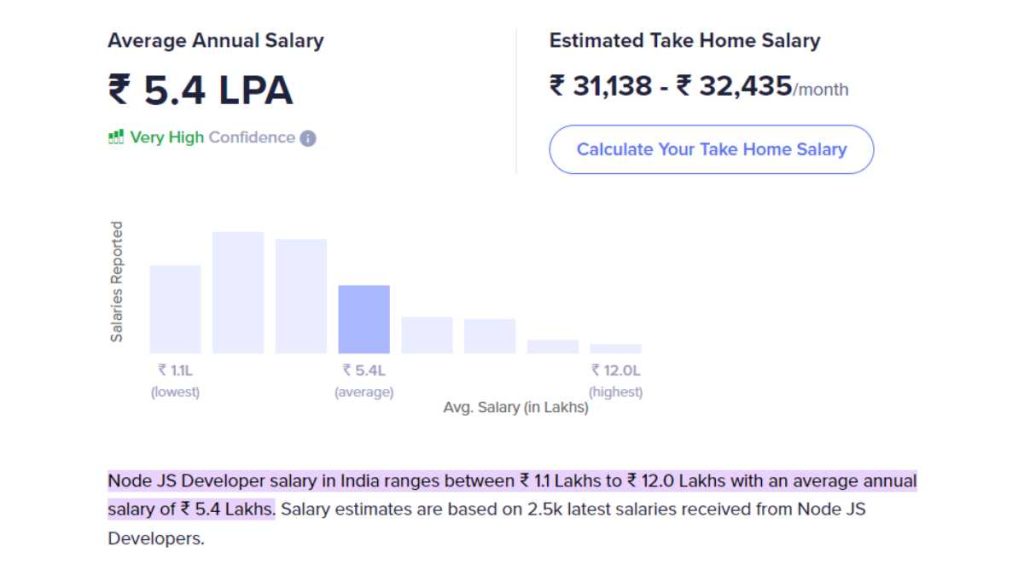Node.js is an open-source, cross-platform runtime environment for executing JavaScript code outside of a web browser. It is based on the V8 JavaScript engine that underpins Google Chrome.
Node.js debuted in 2009 and has since progressed to become one of the most popular technologies for developing speedy and scalable web-based applications.
In this article, we’ll look at what it takes to become a Node js developer skills, the competencies you’ll need, and some of the career options in this fascinating industry.
Table of Contents
What is Node.js?
Developers have embraced Node.js as a strong and adaptable framework for creating server-side applications in recent years. Node.js is essentially a JavaScript runtime framework that allows coders to run JavaScript code independent of a web browser, which makes it perfect for creating scalable, responsive apps.
Envision Node.js to be a chef’s kitchen in which several delicacies can be prepped and crisped at the same time. The same is true for Node.js, which enables developers to oversee multiple activities and requests concurrently, all in a single thread.
A Node.js application, for instance, may successfully manage simultaneously HTTP requests, database queries, and user authentication without experiencing any lag or crashes.
Slack, a well-known chat application, is yet another ideal demonstration. Slack uses Node.js to maintain millions of real-time user interactions. Among many others, Node.js also runs well-known web apps like Netflix, LinkedIn, and PayPal.
Node.js, which provides developers with a productive and scalable framework to create potent, real-time apps, is, in essence, a game-changer in the realm of server-side programming.
Node js Developer Skills Required
Nowadays, Node.js has grown to be one of the most well-liked and commonly used frameworks. It has modified the procedure for developing web applications and offered developers fresh choices.
It necessitates specific expertise to succeed as a node.js developer since these skills are in great demand. Here are the top Node js developer skills:
JavaScript
JavaScript is the foundation of Node.js development. A thorough understanding of JavaScript is essential for creating server-side applications, as Node.js itself is built on JavaScript.
Developers must not only be proficient in the language but also be aware of its quirks, best practices, and the latest ECMAScript standards. This knowledge enables them to write clean, efficient, and scalable code that can handle diverse server tasks.
Asynchronous Programming
Node.js is celebrated for its non-blocking, event-driven architecture. To leverage this, developers must grasp asynchronous programming principles, including callbacks, promises, and async/await.
Callbacks are a fundamental concept, enabling functions to run asynchronously. Promises simplify handling asynchronous operations by providing a structured way to manage results or errors.
The async/await syntax streamlines asynchronous code, making it more readable and maintainable. Proficiency in these concepts is crucial for managing multiple concurrent operations efficiently and avoiding callback hell.
Node.js Frameworks
Node.js offers a variety of frameworks that expedite development. Express.js is one of the most popular, known for its minimalistic design and robust features. Koa.js, built by the creators of Express, is known for its modern async/await support. Hapi.js emphasizes configuration-driven development.
Developers should be well-versed in at least one of these frameworks, as they streamline common tasks and offer a structured foundation for building applications. The choice of framework depends on project requirements, such as complexity, scalability, and specific features needed.
Understanding of Databases
Node.js applications frequently interact with databases to store, retrieve, and manipulate data. Developers should be familiar with database management systems like MySQL, MongoDB, and PostgreSQL. Proficiency in CRUD operations (Create, Read, Update, Delete), schema design, query optimization, and data modelling is crucial.
A deep understanding of how to establish connections to databases, manage transactions, and ensure data consistency and security is paramount for creating robust applications.
RESTful API Development
RESTful APIs (Representational State Transfer) are the standard for modern web services. Node.js is well-suited for building RESTful APIs. Developers need to be proficient in designing API endpoints, handling HTTP requests, and providing JSON responses.
They should understand the principles of REST, such as statelessness and resource-based communication. Developing RESTful APIs allows applications to communicate effectively with other services and clients, making it a fundamental skill for Node.js developers.
Knowledge of Web Technologies
Node.js is often used in conjunction with front-end technologies like HTML, CSS, and JavaScript frameworks such as React or Angular. Developers should be capable of harmoniously integrating these technologies to create a seamless user experience.
This includes building APIs to communicate with the front end, rendering dynamic content, and ensuring consistent styling and responsiveness across the application. Understanding the interactions between Node.js and front-end technologies is vital for creating cohesive web applications.
Debugging and Testing Skills
Debugging is the process of identifying and fixing issues in code. Node.js developers need strong debugging skills to diagnose problems in server-side scripts. Proficiency in using debugging tools, log analysis, and error-tracking systems is essential. In addition to debugging, creating automated tests is vital.
Developers should be able to write unit tests, integration tests, and end-to-end tests to ensure the reliability and performance of their applications. Testing frameworks like Mocha and Jest are commonly used in the Node.js ecosystem.
Scalability and Performance Optimization
Node.js is renowned for its ability to handle concurrent connections efficiently. Developers should understand scalability and performance optimization techniques to make the most of this capability.
This includes implementing strategies like caching to reduce redundant data retrieval, load balancing to distribute incoming requests evenly across multiple servers, and minimizing network latency to improve response times.
Proficiency in these areas is crucial for applications that need to accommodate high traffic loads while maintaining responsiveness.
Security
Web application security is of utmost importance. Node.js developers should be well-versed in security best practices.
This includes knowledge of securing data in transit and at rest through encryption, implementing user authentication and authorization, protecting against common vulnerabilities like SQL injection and Cross-Site Scripting (XSS), and following security standards and compliance requirements.
Security measures should be applied at both the application and server levels to safeguard against data breaches and unauthorized access.
Continuous Learning
Node.js is a rapidly evolving technology, with new features, libraries, and best practices emerging frequently. Node.js developers should be committed to continuous learning to stay current with the latest developments in the field.
This includes keeping up with the newest Node.js frameworks, JavaScript language features, security threats, and performance optimization techniques.
Additionally, staying engaged with the developer community, attending conferences, and exploring online resources are essential for maintaining a competitive edge and delivering cutting-edge solutions in the ever-evolving world of web development.
If you are already a front-end developer working on Angular or React, you must join a NodeJS course and get skilled in the back-end to develop as a MEAN/MERN STACK developer.
Node.js Case Studies
Node.js’s capacity to manage massive quantities of data and deliver superior pace has revolutionized the field of web development. The open-source, cross-platform JavaScript runtime environment has been rapidly embraced by businesses of all sizes and sectors to generate authentic and reliable apps and APIs.
Several of the leading businesses in the world have built high-performance web apps and APIs using Node.js. Let’s look at a few instances:
- LinkedIn – Node.js was used to completely rewrite LinkedIn’s mobile app, which gave it a 20x speed boost. The outcome? Users may now access the platform more swiftly and efficiently thanks to a startling 20x boost in speed. By using Node.js, LinkedIn was able to manage the heavy traffic on its mobile app and provide a flawless user experience.
- Netflix – Netflix is another example that has harnessed the power of Node.js. Its server-side rendering is powered by Node.js, which enables quicker load times and better SEO for the streaming behemoth. Netflix can serve content to its viewers more rapidly thanks to Node.js, which increases user retention and engagement for the platform.
- Walmart – One of the biggest retailers in the world, Walmart, has also included Node.js in their online store. Walmart was able to create a highly scalable website using Node.js that can manage a lot of traffic during busy times like Black Friday and Cyber Monday. Further, Walmart has been able to develop novel features and capabilities more rapidly courtesy of Node.js, accelerating time-to-market.
These are just a few instances of the various enterprises that have profited from employing Node.js. Whether you’re developing an extensive web application or a comparatively tiny API, Node.js can help you offer superior speed, scalability, and effectiveness.
The development, testing, and deployment of apps are indeed made simple by its vast ecosystem of tools and packages, conserving programmer’s hours and labour.
Job Opportunities for Node.js Developers
Node.js is becoming a necessary technology for web development in the fast-paced digital world of today. Developers may build effective and scalable apps for a variety of industries using this strong and adaptable platform. The employment market for Node.js developers has never been better given the growing market for the framework.
Some of the potential career options for Node.js developers are highlighted below:
Backend Developer
As a backend developer, you will be in charge of developing and implementing the server side of web applications. This covers data management as well as assuring the application’s efficiency and scalability. Due to its speed and flexibility to support several connections at once, Node.js is a popular choice for backend development.
Full Stack Developer
The frontend and backend development of web applications falls within the purview of a full-stack developer. Creating user interfaces, putting functionality into place, and overseeing the application’s server-side tasks are all part of it. Since it can manage both frontend and backend operations, Node.js is a preferred choice for full-stack development.
DevOps Engineer
A DevOps engineer is in charge of designing and managing web application infrastructure. This includes maintaining servers, deploying applications, and making sure the application is operating as intended. Since it can manage high-traffic volumes and is simple to use when writing automated scripts, Node.js is frequently used in DevOps.
IoT Developer
IoT developers are responsible for building software that interfaces with a wide range of gadgets, including sensors, cameras, and other IoT devices. Due to its propensity for managing asynchronous operations and its minimal overhead needs, Node.js is frequently employed in the creation of IoT systems.
Software Architect
The architecture of web applications is designed and implemented by a software architect. This includes selecting the relevant technologies, creating the application’s general structure, and verifying that it fulfils the business’s requirements.
Due to its adaptability and capacity for handling complicated applications, Node.js is frequently used in software architecture.
Thus, Node.js engineers have a wide variety of employment options at their disposal. The moment is right to think about a career in Node.js development given the growing need for the technology across a number of sectors.
Whether you’re specialized in backend development, full stack development, DevOps, IoT development, or software architecture, Node.js provides an extensive and versatile foundation for creating effective and scalable applications.
NodeJS Developer Salary in India

In India, Node.js developer salaries vary based on experience, location, and the specific company. Entry-level Node.js developers can expect to earn around ₹3-6 lakhs per annum, while mid-level professionals with a few years of experience can earn between ₹6-12 lakhs annually.
Senior Node.js developers, possessing extensive expertise, can command salaries ranging from ₹12-20 lakhs or more. Major tech hubs like Bangalore, Hyderabad, and Pune often offer higher salaries due to increased demand for Node.js expertise.
Additionally, Node.js developers can enhance their earning potential by acquiring additional skills such as cloud computing, full-stack development, and front-end technologies.
NodeJS Developer Salaries in Company
| Company | Experience Level | Salary |
|---|---|---|
| TCS | 1-5 Yrs | ₹4.9 L |
| CAPGEMINI | 1-5 Yrs | ₹7.1 L |
| NoBroker | 0-3 Yrs | ₹12 L |
| HCL | 1-7 Yrs | ₹9.3 L |
| ACCENTURE | 2-5 Yrs | ₹9.6 L |
Top Paying Industries For NodeJS
- Internet – ₹9.2 Lakhs per year.
- Financial Services – ₹7.2 Lakhs per year.
- Software Product – ₹7.0 Lakhs per year.
- IT Services & Consulting – ₹5.8 Lakhs per year.
- Recruitment – ₹5.5 Lakhs per year.
Conclusion
For developers who are ready to invest the time and effort to acquire the necessary skills, node.js is a fascinating and constantly expanding domain that presents a range of possibilities. Node.js is a great option when you’re hoping to develop apps for the web, APIs, or other goals. Node.js is destined to be a major player in the web development industry for many years to come, thanks to its high scalability, quick speed, and extensive ecosystem of modules and frameworks.

13+ Yrs Experienced Career Counsellor & Skill Development Trainer | Educator | Digital & Content Strategist. Helping freshers and graduates make sound career choices through practical consultation. Guest faculty and Digital Marketing trainer working on building a skill development brand in Softspace Solutions. A passionate writer in core technical topics related to career growth.




